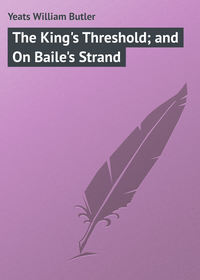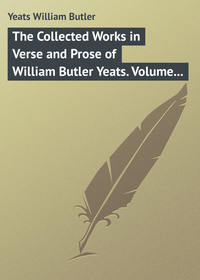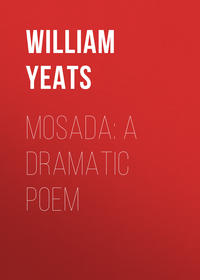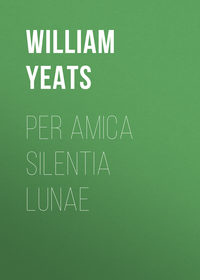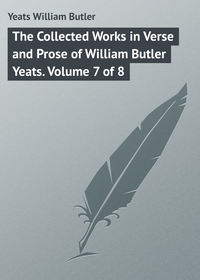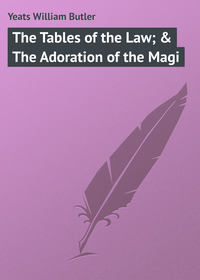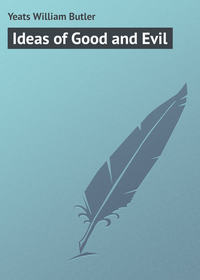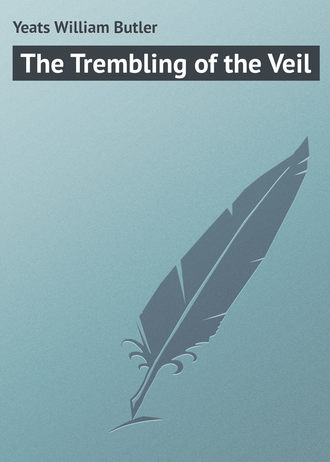 полная версия
полная версияThe Trembling of the Veil
O’Leary’s movements and intonations were full of impulse, but John F. Taylor’s voice in private discussion had no emotional quality except in the expression of scorn; if he moved an arm it moved from the shoulder or elbow alone, and when he walked he moved from the waist only, and seemed an automaton, a wooden soldier, as if he had no life that was not dry and abstract. Except at moments of public oratory, he lacked all personality, though when one saw him respectful and gentle with O’Leary, as with some charming woman, one saw that he felt its fascination. In letters, or in painting, it repelled him unless it were harsh and obvious, and, therefore, though his vast erudition included much art and letters, he lacked artistic feeling, and judged everything by the moral sense. He had great ambition, and had he joined some established party, or found some practicable policy, he might have been followed, might have produced even some great effect, but he must have known that in defeat no man would follow him, as they followed O’Leary, as they followed Parnell. His oratory was noble, strange, even beautiful, at moments the greatest I have ever listened to; but, the speech over, where there had been, as it seemed, so little of himself, all coming from beyond himself, we saw precisely as before an ungainly body in unsuitable, badly-fitting clothes, and heard an excited voice speaking ill of this man or that other. We knew that he could never give us that one price we would accept, that he would never find a practicable policy; that no party would admit, no government negotiate with, a man notorious for a temper, that, if it gave him genius, could at times carry him to the edge of insanity.
Born in some country town, the son of some little watchmaker, he had been a shop assistant, put himself to college and the bar, learned to speak at temperance meetings and Young Ireland societies, and was now a Queen’s Counsel famous for his defence of country criminals, whose cases had seemed hopeless – Taylor’s boys, their neighbours called them or they called themselves. He had shaped his style and his imagination from Carlyle, the chief inspirer of self-educated men in the ’eighties and early ’nineties. “I prefer Emerson’s Oversoul,” the Condalkin cobbler said to me, “but I always read Carlyle when I am wild with the neighbours”; but he used his master’s style, as Mitchell had done before, to abase what his master loved, to exalt what his master scorned. His historical erudition seemed as vast as that of York Powell, but his interests were not Powell’s, for he had no picture before the mind’s eye, and had but one object – a plea of not guilty – entered in his country’s name before a jury which he believed to be packed. O’Leary cared nothing for his country’s glory, its individuality alone seemed important in his eyes; he was like some man, who serves a woman all his life without asking whether she be good or bad, wise or foolish; but Taylor cared for nothing else; he was so much O’Leary’s disciple that he would say in conversation, “We are demoralised, what case for change if we are not?” for O’Leary admitted no ground for reform outside the moral life, but when he spoke to the great plea he would make no admission. He spoke to it in the most obscure places, in little halls in back streets where the white-washed walls are foul with grease from many heads, before some audience of medical students or of shop assistants, for he was like a man under a curse, compelled to hide his genius, and compelled to show in conspicuous places his ill judgment and his temper.
His distaste for myself, broken by occasional tolerance, in so far as it was not distaste for an imagination that seemed to him aesthetic rather than ethical, was because I had published Irish folk-lore in English reviews to the discredit, as he thought, of the Irish peasantry, and because, England within earshot, I found fault with the Young Ireland prose and poetry. He would have hated The Playboy of the Western World, and his death a little before its performance was fortunate for Synge and myself. His articles are nothing, and his one historical work, a life of Hugh O’Neill, is almost nothing, lacking the living voice; and now, though a most formidable man, he is forgotten, but for the fading memory of a few friends, and for what an enemy has written here and elsewhere. Did not Leonardo da Vinci warn the imaginative man against pre-occupation with arts that cannot survive his death?
VI
When Carleton was dying in 1870, he said there would be nothing more about Irish Literature for twenty years, and his words were fulfilled, for the land war had filled Ireland with its bitterness; but imagination had begun to stir again. I had the same confidence in the future that Lady Gregory and I had eight or nine years later, when we founded an Irish Theatre, though there were neither, as it seemed, plays or players. There were already a few known men to start my popular series, and to keep it popular until the men, whose names I did not know, had learnt to express themselves. I had met Dr. Douglas Hyde when I lived in Dublin, and he was still an undergraduate. I have a memory of meeting in college rooms for the first time a very dark young man, who filled me with surprise, partly because he had pushed a snuffbox towards me, and partly because there was something about his vague serious eyes, as in his high cheek bones, that suggested a different civilization, a different race. I had set him down as a peasant, and wondered what brought him to college, and to a Protestant college, but somebody explained that he belonged to some branch of the Hydes of Castle Hyde, and that he had a Protestant Rector for father. He had much frequented the company of old countrymen, and had so acquired the Irish language, and his taste for snuff, and for moderate quantities of a detestable species of illegal whiskey distilled from the potato by certain of his neighbours. He had already – though intellectual Dublin knew nothing of it – considerable popularity as a Gaelic poet, mowers and reapers singing his songs from Donegal to Kerry. Years afterwards I was to stand at his side and listen to Galway mowers singing his Gaelic words without knowing whose words they sang. It is so in India, where peasants sing the words of the great poet of Bengal without knowing whose words they sing, and it must often be so where the old imaginative folk life is undisturbed, and it is so amongst schoolboys who hand their story books to one another without looking at the title page to read the author’s name. Here and there, however, the peasants had not lost the habit of Gaelic criticism, picked up, perhaps, from the poets who took refuge among them after the ruin of the great Catholic families, from men like that O’Rahilly, who cries in a translation from the Gaelic that is itself a masterpiece of concentrated passion —
“The periwinkle and the tough dog-fishTowards evening time have got into my dish.”An old rascal was kept in food and whiskey for a fortnight by some Connaught village under the belief that he was Craoibhin Aoibhin, “the pleasant little branch,” as Doctor Hyde signed himself in the newspapers where the villagers had found his songs. The impostor’s thirst only strengthened belief in his genius, for the Gaelic song-writers have had the infirmities of Robert Burns, “It is not the drink but the company,” one of the last has sung. Since that first meeting Doctor Hyde and I had corresponded, and he had sent me in manuscript the best tale in my Faery and Folk Tales, and I think I had something to do with the London publication of his Beside the Fire, a book written in the beautiful English of Connaught, which is Gaelic in idiom and Tudor in vocabulary, and indeed, the first book to use it in the expression of emotion and romance, for Carleton and his school had turned it into farce. Henley had praised him, and York Powell had said, “If he goes on as he has begun, he will be the greatest folk-loreist who has ever lived”; and I know no first book of verse of our time that is at once so romantic and so concrete as his Gaelic Abhla de’n Craoibh; but in a few years Dublin was to laugh him, or rail him, out of his genius. He had no critical capacity, having indeed for certain years the uncritical folk-genius, as no educated Irish or Englishman has ever had it, writing out of an imitative sympathy like that of a child catching a tune and leaving it to chance to call the tune; and the failure of our first attempt to create a modern Irish literature permitted the ruin of that genius. He was to create a great popular movement, far more important in its practical results than any movement I could have made, no matter what my luck, but, being neither quarrelsome nor vain, he will not be angry if I say – for the sake of those who come after us – that I mourn for the “greatest folk-loreist who ever lived,” and for the great poet who died in his youth. The Harps and Pepperpots got him and the Harps and Pepperpots kept him till he wrote in our common English – “It must be either English or Irish,” said some patriotic editor, Young Ireland practice in his head – that needs such sifting that he who would write it vigorously must write it like a learned language, and took for his model the newspaper upon his breakfast table, and became for no base reason beloved by multitudes who should never have heard his name till their schoolmasters showed it upon his tomb. That very incapacity for criticism made him the cajoler of crowds, and of individual men and women; “He should not be in the world at all,” said one admiring elderly woman, “or doing the world’s work”; and for certain years young Irish women were to display his pseudonym, “Craoibhin Aoibhin,” in gilt letters upon their hat bands.
“Dear Craoibhin Aoibhin…impart to us,We’ll keep the secret, a new trick to please;Is there a bridle for this ProteusThat turns and changes like his draughty seas,Or is there none, most popular of men,But, when they mock us, that we mock again?”VII
Standish O’Grady, upon the other hand, was at once all passion and all judgment. And yet those who knew him better than I assured me he could find quarrel in a straw; and I did know that he had quarrelled a few years back with Jack Nettleship. Nettleship’s account had been, “My mother cannot endure the God of the Old Testament, but likes Jesus Christ; whereas I like the God of the Old Testament, and cannot endure Jesus Christ; and we have got into the way of quarrelling about it at lunch; and once, when O’Grady lunched with us, he said it was the most disgraceful spectacle he had ever seen, and walked out.” Indeed, I wanted him among my writers, because of his quarrels, for, having much passion and little rancour, the more he quarrelled, the nobler, the more patched with metaphor, the more musical his style became, and if he were in his turn attacked, he knew a trick of speech that made us murmur, “We do it wrong, being so majestical, to offer it the show of violence.” Sometimes he quarrelled most where he loved most. A Unionist in politics, a leader-writer on The Daily Express, the most Conservative paper in Ireland, hater of every form of democracy, he had given all his heart to the smaller Irish landowners, to whom he belonged, and with whom his childhood had been spent, and for them he wrote his books, and would soon rage over their failings in certain famous passages that many men would repeat to themselves like poets’ rhymes. All round us people talked or wrote for victory’s sake, and were hated for their victories – but here was a man whose rage was a swan-song over all that he had held most dear, and to whom for that very reason every Irish imaginative writer owed a portion of his soul. In his unfinished History of Ireland he had made the old Irish heroes, Fion, and Oisin, and Cuchullan, alive again, taking them, for I think he knew no Gaelic, from the dry pages of O’Curry and his school, and condensing and arranging, as he thought Homer would have arranged and condensed. Lady Gregory has told the same tales, but keeping closer to the Gaelic text, and with greater powers of arrangement and a more original style, but O’Grady was the first, and we had read him in our ’teens. I think that, had I succeeded, a popular audience could have changed him little, and that his genius would have stayed, as it had been shaped by his youth in some provincial society, and that to the end he would have shown his best in occasional thrusts and parries. But I do think that if, instead of that one admirable little book The Bog of Stars, we had got all his histories and imaginative works into the hands of our young men, he might have brought the imagination of Ireland nearer the Image and the honeycomb.
Lionel Johnson was to be our critic, and above all our theologian, for he had been converted to Catholicism, and his orthdoxy, too learned to question, had accepted all that we did, and most of our plans. Historic Catholicism, with all its counsels and its dogmas, stirred his passion like the beauty of a mistress, and the unlearned parish priests who thought good literature or good criticism dangerous were in his eyes “all heretics.” He belonged to a family that had called itself Irish some generations back, and its recent English generations but enabled him to see as one single sacred tradition Irish nationality and Catholic religion. How should he fail to know the Holy Land? Had he not been in Egypt? He had joined our London Irish Literary Society, attended its committee meetings, and given lectures in London, in Dublin, and in Belfast, on Irish novelists and Irish poetry, reading his lectures always, and yet affecting his audience as I, with my spoken lectures, could not, perhaps because Ireland had still the shape it had received from the eighteenth century, and so felt the dignity, not the artifice, of his elaborate periods. He was very little, and at a first glance he seemed but a schoolboy of fifteen. I remember saying one night at the Rhymers’, when he spoke of passing safely, almost nightly, through Seven Dials, then a dangerous neighbourhood, “Who would expect to find anything in your pockets but a pegtop and a piece of string?” But one never thought of his small stature when he spoke or read. He had the delicate strong features of a certain filleted head of a Greek athlete in the British Museum, an archaistic Graeco-Roman copy of a masterpiece of the fourth century, and that resemblance seemed symbolic of the austere nobility of his verse. He was now in his best years, writing with great ease and power; neither I, nor, I think, any other, foresaw his tragedy.
He suffered from insomnia, and some doctor, while he was still at the University, had recommended alcohol, and he had, in a vain hope of sleep, increased the amount, as Rossetti had increased his doses of chloral, and now he drank for drinking’s sake. He drank a great deal too much, and, though nothing could, it seemed, disturb his calm or unsteady his hand or foot, his doctrine, after a certain number of glasses, would become more ascetic, more contemptuous of all that we call human life. I have heard him, after four or five glasses of wine, praise some church father who freed himself from sexual passion by a surgical operation, and deny with scorn, and much historical evidence, that a gelded man lost anything of intellectual power. Even without stimulant his theology conceded nothing to human weakness, and I can remember his saying with energy, “I wish those people who deny the eternity of punishment could realise their unspeakable vulgarity.”
Now that I know his end, I see him creating, to use a favourite adjective of his, “marmorean” verse, and believing the most terrible doctrines to keep down his own turbulence. One image of that stay in Dublin is so clear before me that it has blotted out most other images of that time. He is sitting at a lodging-house table, which I have just left at three in the morning, and round him lie or sit in huddled attitudes half-a-dozen men in various states of intoxication: and he is looking straight before him with head erect, and one hand resting upon the table. As I reach the stairs I hear him say, in a clear, unshaken voice, “I believe in nothing but the Holy Roman Catholic Church.” He sometimes spoke of drink as something which he could put aside at any moment, and his friends believed, and I think he liked us to believe, that he would shortly enter a monastery. Did he deceive us deliberately? Did he himself already foresee the moment when he would write The Dark Angel? I am almost certain that he did, for he had already written Mystic and Cavalier, where the historical setting is, I believe, but masquerade.
“Go from me: I am one of those, who fall.What! hath no cold wind swept your heart at all,In my sad company? Before the end,Go from me, dear my friend!Yours are the victories of light: your feetRest from good toil, where rest is brave and sweet.But after warfare in a mourning gloomI rest in clouds of doom.·····Seek with thine eyes to pierce this crystal sphere:Canst read a fate there, prosperous and clear?Only the mists, only the weeping clouds:Dimness, and airy shrouds.·····O rich and sounding voices of the air!Interpreters and prophets of despair:Priests of a fearful sacrament! I comeTo make with you my home.”VIII
Sir Charles Gavan Duffy arrived. He brought with him much manuscript, the private letters of a Young Ireland poetess, a dry but informing unpublished historical essay by Davis, and an unpublished novel by William Carleton, into the middle of which he had dropped a hot coal, so that nothing remained but the borders of every page. He hired a young man to read him, after dinner, Carlyle’s Heroes and Hero-Worship, and before dinner was gracious to all our men of authority and especially to our Harps and Pepperpots. Taylor compared him to Odysseus returning to Ithaca, and every newspaper published his biography. He was a white-haired old man, who had written the standard history of Young Ireland, had emigrated to Australia, had been the first Australian Federalist, and later Prime Minister, but, in all his writings, in which there is so much honesty, so little rancour, there is not one sentence that has any meaning when separated from its place in argument or narrative, not one distinguished because of its thought or music. One imagined his youth in some little gaunt Irish town, where no building or custom is revered for its antiquity; and there speaking a language where no word, even in solitude, is ever spoken slowly and carefully because of emotional implication; and of his manhood of practical politics, of the dirty piece of orange-peel in the corner of the stairs as one climbs up to some newspaper office; of public meetings where it would be treacherous amid so much geniality to speak, or even to think of anything that might cause a moment’s misunderstanding in one’s own party. No argument of mine was intelligible to him, and I would have been powerless, but that fifty years ago he had made an enemy, and though that enemy was long dead, his school remained. He had attacked, why or with what result I do not remember, the only Young Ireland politician who had music and personality, though rancorous and devil-possessed. At some public meeting of ours, where he spoke amid great applause, in smooth, Gladstonian periods, of his proposed Irish publishing firm, one heard faint hostile murmurs, and at last a voice cried, “Remember Newry,” and a voice answered, “There is a grave there!” and a part of the audience sang, “Here’s to John Mitchell that is gone, boys, gone; Here’s to the friends that are gone.” The meeting over, a group of us, indignant that the meeting we had called for his welcome should have contained those malcontents, gathered about him to apologize. He had written a pamphlet, he explained: he would give us copies. We would see that he was in the right, how badly Mitchell had behaved. But in Ireland personality, if it be but harsh and hard, has lovers, and some of us, I think, may have gone home muttering, “How dare he be in the right if Mitchell is in the wrong?”
IX
He wanted “to complete the Young Ireland movement” – to do all that had been left undone because of the Famine, or the death of Davis, or his own emigration; and all the younger men were upon my side in resisting that. They might not want the books I wanted, but they did want books written by their own generation, and we began to struggle with him over the control of the company. Taylor became very angry, and I can understand what I looked like in his eyes, when I remember Edwin Ellis’s seriously-intended warning, “It is bad manners for a man under thirty to permit himself to be in the right.” But John O’Leary supported me throughout.
When Gavin Duffy had gone to London to draw up articles of association for his company, for which he had found many shareholders in Dublin, the dispute became very fierce. One night members of the general public climbed the six flights of stairs to our committee room, now no longer in the Mansion House, and found seats for themselves just behind our chairs. We were all too angry to send them away, or even to notice their presence, for I was accused of saying at a public meeting in Cork, “Our books,” when I should have said, “Sir Charles Gavan Duffy’s books.” I was not Taylor’s match with the spoken word, and barely matched him with the written word. At twenty-seven or twenty-eight I was immature and clumsy, and O’Leary’s support was capricious, for, being but a spectator of life, he would desert me if I used a bad argument, and would not return till I found a good one; and our chairman, Dr. Hyde, “most popular of men,” sat dreaming of his old white cockatoo in far-away Roscommon. Our very success had been a misfortune, for an opposition which had been literary and political, now that it had spread to the general public, brought religious prejudice to its aid. Suddenly, when the company seemed all but established, and a scheme had been thought out which gave some representation on its governing board to contemporary Irish writers, Gavan Duffy produced a letter from Archbishop Walsh, and threw the project up. The letter had warned him that after his death the company would fall under a dangerous influence. At this moment the always benevolent friend, to whom I had explained in confidence, when asking his support, my arrangements with my publisher, went to Gavan Duffy and suggested that they should together offer Mr Fisher Unwin a series of Irish books, and Mr Fisher Unwin and his reader accepted the series under the belief that it was my project that they accepted. I went to London to find the contract signed, and that all I could do was to get two sub-editors appointed, responsible to the two societies. Two or three good books were published, especially Dr. Hyde’s Short History of Gaelic Literature, and Standish O’Grady’s Bog of Stars; but the series was killed by its first volume, Thomas Davis’s dry but informing historical essay. So important had our movement seemed that ten thousand copies had been sold before anybody had time to read it, and then came a dead stop.
Gavan Duffy knew nothing of my plans, and so was guiltless, and my friend had heard me discuss many things that evening. I had perhaps dispraised the humanitarian Stephen Phillips, already in his first vogue, and praised Francis Thompson, but half-rescued from his gutter; or flouted his belief in the perpetual marriage of genius and virtue by numbering the vices of famous men; this man’s venery, that man’s drink. He could not be expected to remember that where I had said so much of no account, I said one thing, and he had made no reply, that I thought of great account. He died a few months ago, and it would have surprised and shocked him if any man had told him that he was unforgiven; had he not forgotten all about it long ago? A German doctor has said that if we leave an umbrella at a friend’s house it is because we have a sub-conscious desire to re-visit that house; and he had perhaps a sub-conscious desire that my too tumultuous generation should not have its say.
X
I was at Sligo when I received a letter from John O’Leary, saying that I could do no more in Dublin, for even the younger men had turned against me, were “jealous,” his letter said, though what they had to be jealous of God knows. He said further that it was all my own fault, that he had warned me what would happen if I lived on terms of intimacy with those I tried to influence. I should have kept myself apart and alone. It was all true; through some influence from an earlier generation, from Walt Whitman, perhaps, I had sat talking in public bars, had talked late into the night at many men’s houses, showing all my convictions to men that were but ready for one, and used conversation to explore and discover among men who looked for authority. I did not yet know that intellectual freedom and social equality are incompatible; and yet, if I had, could hardly have lived otherwise, being too young for silence. The trouble came from half a dozen obscure young men, who having nothing to do attended every meeting and were able to overturn a project, that seemed my only bridge to other projects, including a travelling theatre. We had planned small libraries of Irish literature in connection with our country branches; we collected books and money, sending a lecturer to every branch and taking half the proceeds of that lecture to buy books. Maud Gonne, whose beauty could draw a great audience in any country town, had been the lecturer. The scheme was very nearly self-supporting, and six or seven bundles of books, chosen after much disputation by John O’Leary, J. F. Taylor, and myself, had been despatched to some six or seven branches. “The country will support this work” Taylor had said somewhere on some public platform, “because we are the most inflammable people on God’s earth,” his harsh voice giving almost a quality of style to Carlylian commonplace; but we are also a very jealous people. The half-a-dozen young men, if a little jealous of me, were still more jealous of those country branches which were getting so much notice, and where there was so much of that peasant mind their schoolmasters had taught them to despise. One must be English or Irish, they would have said. I returned to find a great box of books appropriated for some Dublin purpose and the whole scheme abandoned. I know that it was a bitter moment because I remember with gratitude words spoken not to my ear, but for my ear, by a young man who had lately joined our Society, Mr. Stephen McKenna, now well-known amongst scholars for his distinguished translations of Plotinus, and I seem to remember that I lost through anger what gift of persuasion I may possess, and that I was all the more helpless because I felt that even the best of us disagreed about everything at heart. I began to feel that I needed a hostess more than a society, but that I was not to find for years to come. I tried to persuade Maud Gonne to be that hostess, but her social life was in Paris, and she had already formed a new ambition, the turning of French public opinion against England. Without intellectual freedom there can be no agreement, and in Nationalist Dublin there was not – indeed there still is not – any society where a man is heard by the right ears, but never overheard by the wrong, and where he speaks his whole mind gaily, and is not the cautious husband of a part; where phantasy can play before matured into conviction; where life can shine and ring, and lack utility. Mere life lacking the protection of wealth or rank, or some beauty’s privilege of caprice cannot choose its company, taking up and dropping men merely because it likes, or dislikes, their manners and their looks, and in its stead opinion crushes and rends, and all is hatred and bitterness: wheel biting upon wheel, a roar of steel or iron tackle, a mill of argument grinding all things down to mediocrity. If, as I think, minds and metals correspond the goldsmiths of Paris foretold the French Revolution when they substituted steel for that unserviceable gold in the manufacture of the more expensive jewel work, and made those large, flat steel buttons for men of fashion whereby the card players were able to cheat by studying the reflections of the cards.


